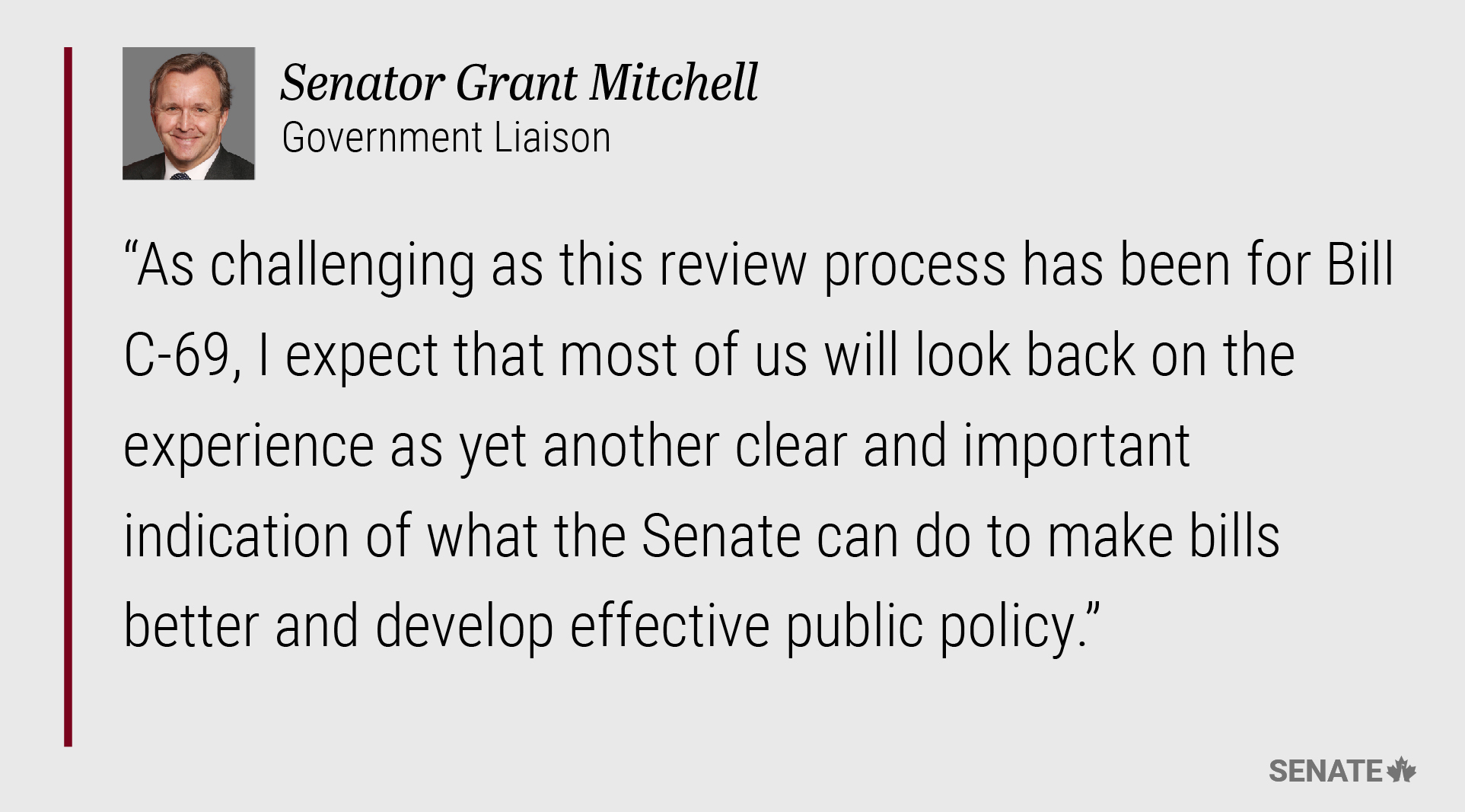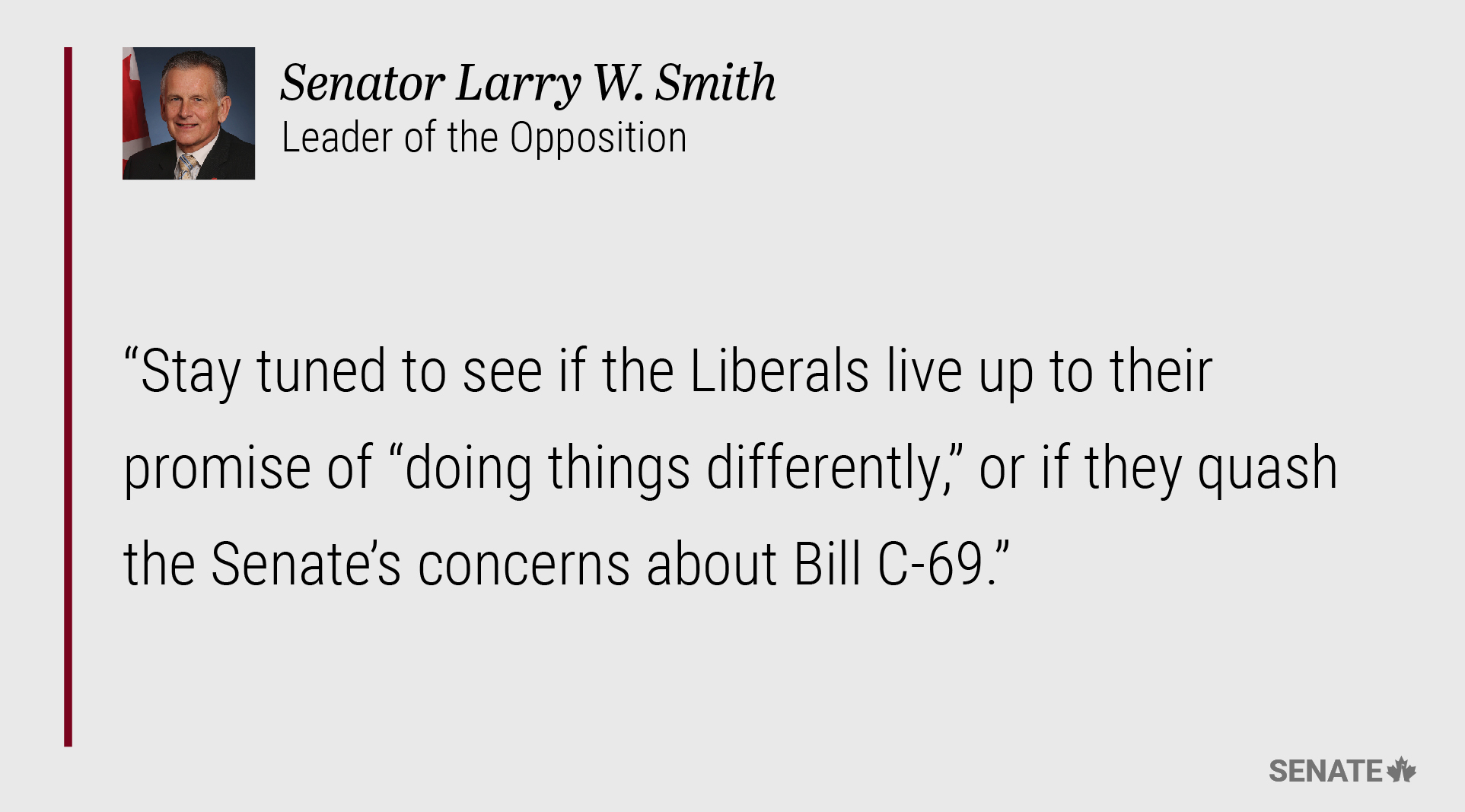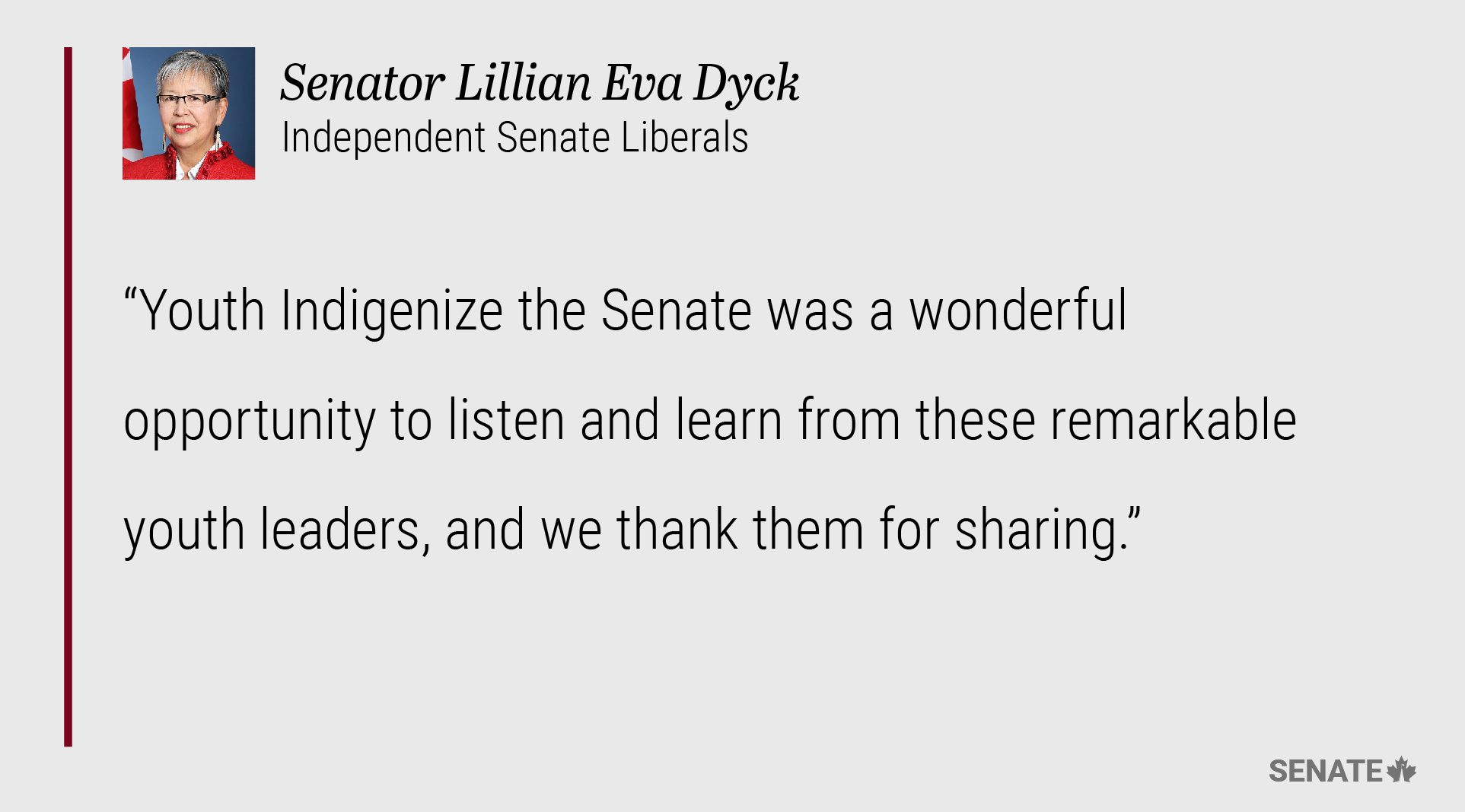Perspectives — June 3-6, 2019

Last week in the Senate: voting on the Oil Tanker Moratorium Act and the Impact Assessment Act, celebrating Indigenous History Month and Youth Indigenize the Senate.

Government
Legislation to streamline the environmental impact assessment process for major projects in Canada was recently adopted in the Senate following an intensive review that led to a complex set of proposals to improve the bill.
Bill C-69, which arrived in the Senate in June 2018, was the subject of extensive study at the Senate Committee on Energy, the Environment and Natural Resources. Over the course of more than 100 hours of meetings, the committee heard a diversity of views from some 270 witnesses during a tour of 10 cities across Canada.
Our deliberations and the input we received have, at times, been intense, emotional, loud and divisive, but none of this came as a surprise. The stakes are very high.
As challenging as this review process has been for Bill C-69, I expect that most of us will look back on the experience as yet another clear and important indication of what the Senate can do to make bills better and develop effective public policy.
The broad range of amendments proposed by the Senate aim to, among other things:
- clarify how the factors considered during an impact assessment will be scoped earlier, according to the particulars of each project;
- delegate ministerial powers to officials to reduce political discretion;
- enhance the involvement of lifecycle regulators and offshore boards to ensure their expertise is taken into account;
- lower the risk of litigation; and
- include additional references to the impacts on Indigenous women.
The amended bill is now before the House of Commons for consideration.

Opposition
The talking points of an independent Senate ring more and more hollow with every passing day of Senate business. This week was, sadly, no exception.
For example, normally the Senate Chamber respects the direction of committees when they report back on whether to accept, reject or amend legislation.
So when the Senate’s Transport and Communications Committee voted across party lines recently to kill Bill C-48, the so-called BC tanker ban, a truly independent Senate would have taken the information being put forward by the committee, and voted to accept the recommendation from the committee to not proceed with the bill.
But that’s not what happened. Even though they were told this would stoke the fires of Western alienation, and that there was no evidence this legislation would be effective, all but one of the Trudeau-appointed senators voted to support the Liberal government and overruled the committee’s recommendation on the bill.
As for Bill C-69, more than 180 amendments proposed by senators on both sides of the aisle were approved this week at third reading. The amendments moved by Conservative senators were based on concerns raised by elected governments of all political stripes across the country and by people directly affected on the front line of our resource industry.
The amended bill will now go back to the House of Commons for the Trudeau Liberals to decide if they will accept the sober second thought of the Senate, or if they will adopt a partisan approach that disregards provincial concerns.
Stay tuned to see if the Liberals live up to their promise of “doing things differently,” or if they quash the Senate’s concerns about Bill C-69.

Senate Liberals
Last week saw eight remarkable Indigenous youths participating in the Youth Indigenize the Senate program, which brings young community leaders from across the country to testify at the Senate Committee on Aboriginal Peoples.
Christine Luza, of the M’Chigeeng First Nation in Ontario, sits on the steering committee of Naadmaagit Ki Group.
Trevor Dubois, a two-spirited individual originally from Prince Albert, works to address systemic injustices faced by marginalized groups in the community.
Jukipa Kotierk is a proud Inuk woman originally from Igloolik, Nunavut but now lives and works in Iqaluit for the Quality of Life Secretariat with the Government of Nunavut.
Aurora Leddy is a proud Métis woman who grew up in Edmonton, where she teaches Métis jigging classes and visits schools to teach youth about Métis culture.
Richard Lush, from Prince Edward Island, works with the Music is Alive program, which teaches young people about the importance of traditional and non-traditional music.
Taylor Morriseau, a proud member of the Peguis First Nation, is a PhD student at the Children’s Hospital Research Institute of Manitoba.
Karlee Johnson, lives in the Eskasoni First Nation in Nova Scotia and works as capacity development lead for cancer learning with the Union of Nova Scotia Indians.
Megan Hébert-Lefebvre is a youth cultural officer of Grand Conseil de la Nation Waban-Aki in Wôlinak and Odanak in Quebec and teaches graphic design to youth.
Youth Indigenize the Senate was a wonderful opportunity to listen and learn from these remarkable youth leaders, and we thank them for sharing.

Independent Senators Group
Last week, I rose to mark the beginning of National Indigenous History Month, a time to reflect on the heritage, culture and contributions of First Nations, Inuit and Métis peoples.
Despite progress, Indigenous peoples across Canada continue to face serious threats. We are the fastest-growing population but experience lower outcomes on many key economic and social indicators.
We are also struggling with realities that challenge our continued existence, namely, the erosion of our cultures, languages and ways of life; the forced removal of our children from families and communities; the massive over-representation of our people in the criminal justice system; and the disappearance and murder of our women and girls.
It is far too easy to become discouraged by the enormity of the challenges in front of us. However, many of us remain optimistic. There is an extraordinary strength and resilience within Indigenous peoples. Each day, across the country, we stand up for our rights and the rights of others. We work tirelessly to build a better future for generations to come. We will not stop. We are undeterred.
This month, I encourage everyone to take time to not only reflect on our shared and, at times, dark history as a nation, but to meet, learn and develop a friendship with Indigenous peoples.
I also call on each of you to take concrete steps — inside and outside of this chamber — to build a more just, equal and inclusive Canada for Indigenous peoples and for all. Wela’lin.


